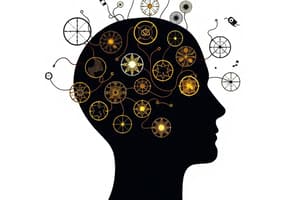Podcast
Questions and Answers
How does philosophical wisdom differ from the ordinary meaning of wisdom?
How does philosophical wisdom differ from the ordinary meaning of wisdom?
- Philosophical wisdom embraces traditional dogmas and beliefs, unlike ordinary wisdom.
- Philosophical wisdom seeks knowledge for personal gain, while ordinary wisdom seeks knowledge for the common good.
- Philosophical wisdom focuses on practical skills, while ordinary wisdom deals with abstract concepts.
- Philosophical wisdom is the pursuit of truth, while ordinary wisdom is the pursuit of cunning. (correct)
According to the perspective presented, what distinguishes metaphysics from scientific observation?
According to the perspective presented, what distinguishes metaphysics from scientific observation?
- Metaphysics relies on empirical data, while scientific observation uses intuition and speculation.
- Metaphysics analyzes only factual matters, while scientific observation deals with abstract qualities.
- Metaphysics is limited to the study of causes, while scientific observation explores different aspects of reality.
- Metaphysics is concerned more with abstract qualities, while scientific observation focuses on factual matters. (correct)
How do determinism and libertarianism differ concerning human actions?
How do determinism and libertarianism differ concerning human actions?
- Determinism and libertarianism both agree that humans are responsible for their actions, but differ on the extent of external influence.
- Determinism suggests that human actions are predetermined, while libertarianism holds that humans are entirely free. (correct)
- Determinism asserts that humans are free to choose their actions, while libertarianism claims actions are predetermined by a higher power.
- Determinism argues that human actions are without causes, while libertarianism posits that every action has a cause.
How did the sophists challenge the existing criterion of knowledge in ancient Greek philosophy?
How did the sophists challenge the existing criterion of knowledge in ancient Greek philosophy?
What is the key distinction between ethical egoism and utilitarianism?
What is the key distinction between ethical egoism and utilitarianism?
What role does the 'middle term' play in a categorical syllogism, and why is it important?
What role does the 'middle term' play in a categorical syllogism, and why is it important?
In the context of relational propositions, what is the difference between a transitive and an intransitive relation?
In the context of relational propositions, what is the difference between a transitive and an intransitive relation?
How did Karl Marx's ideas impact the study of history and society?
How did Karl Marx's ideas impact the study of history and society?
How does the concept of 'original position' as presented by John Rawls function in establishing a just society?
How does the concept of 'original position' as presented by John Rawls function in establishing a just society?
What is the key philosophical question concerning the writing of the history of philosophy, as presented in the text?
What is the key philosophical question concerning the writing of the history of philosophy, as presented in the text?
How does the understanding of Ethics differ in the Greek tradition compared to the Judeo-Christian tradition?
How does the understanding of Ethics differ in the Greek tradition compared to the Judeo-Christian tradition?
Examine the role of senses as an avenue for gaining knowledge, and discuss the potential pitfalls.
Examine the role of senses as an avenue for gaining knowledge, and discuss the potential pitfalls.
In what fundamental way does political science differ from political philosophy?
In what fundamental way does political science differ from political philosophy?
What are the three pillars or principles which Islam is constructed on?
What are the three pillars or principles which Islam is constructed on?
Which field provides legal and ethical framework for resolving conflicts between concerned parties and between societal consensus and individual value
Which field provides legal and ethical framework for resolving conflicts between concerned parties and between societal consensus and individual value
How does Saponifiable lipid contrast with Non saponifiable
How does Saponifiable lipid contrast with Non saponifiable
Differentiate between the types of drug drug administration route emphasizing how the drug is absorped.
Differentiate between the types of drug drug administration route emphasizing how the drug is absorped.
What is the most accurate desciption of An organism'senvironment?
What is the most accurate desciption of An organism'senvironment?
How does the Cholera do so much damages
?
Hint from the chapter
How does the Cholera do so much damages ? Hint from the chapter
Why must environmental polutions be controlled?
Why must environmental polutions be controlled?
What is the relationship between Guidance and goals or objective of guidance?
What is the relationship between Guidance and goals or objective of guidance?
State clearly the main key components of the neurons
State clearly the main key components of the neurons
When Robert Hooke coined the term cell.what major discovery occurrd.
When Robert Hooke coined the term cell.what major discovery occurrd.
Discuss how the process of Development planning takes place in a trio
Discuss how the process of Development planning takes place in a trio
Flashcards
What is Philosophy?
What is Philosophy?
From Greek 'Philo/Philein' (to love) and 'Sophia' (wisdom), it means “The love of wisdom”.
What is Wisdom?
What is Wisdom?
Ability to draw meaning from experience and see beyond what merely meets the eye.
What is Philosophizing?
What is Philosophizing?
To distance oneself from everyday interpretations and prevailing valuations.
Meaning of Wonder
Meaning of Wonder
Signup and view all the flashcards
What is Metaphysics?
What is Metaphysics?
Signup and view all the flashcards
What does Metaphysics concern itself with?
What does Metaphysics concern itself with?
Signup and view all the flashcards
What is Epistemology?
What is Epistemology?
Signup and view all the flashcards
What is Ethics?
What is Ethics?
Signup and view all the flashcards
What is Critical Thinking?
What is Critical Thinking?
Signup and view all the flashcards
What is Logic?
What is Logic?
Signup and view all the flashcards
What is an Argument? (in logic)
What is an Argument? (in logic)
Signup and view all the flashcards
What is a Proposition?
What is a Proposition?
Signup and view all the flashcards
What is Deductive Argument?
What is Deductive Argument?
Signup and view all the flashcards
What are Inductive Arguments?
What are Inductive Arguments?
Signup and view all the flashcards
What is a Simple Proposition?
What is a Simple Proposition?
Signup and view all the flashcards
What is a Compound Proposition?
What is a Compound Proposition?
Signup and view all the flashcards
What is a Symmetrical Relation?
What is a Symmetrical Relation?
Signup and view all the flashcards
What is an Asymmetrical Relation?
What is an Asymmetrical Relation?
Signup and view all the flashcards
What is a Transitive Relation?
What is a Transitive Relation?
Signup and view all the flashcards
What is 'AND' in logic?
What is 'AND' in logic?
Signup and view all the flashcards
What is 'OR' in logic?
What is 'OR' in logic?
Signup and view all the flashcards
What is 'THEN' in logic?
What is 'THEN' in logic?
Signup and view all the flashcards
What is 'NOT' in logic
What is 'NOT' in logic
Signup and view all the flashcards
What is a Negation rule?
What is a Negation rule?
Signup and view all the flashcards
What does Syllogism comprises of?
What does Syllogism comprises of?
Signup and view all the flashcards
What does Ethics concern itself with?
What does Ethics concern itself with?
Signup and view all the flashcards
Human conducts with regard to right and wrong, good and evil.
Human conducts with regard to right and wrong, good and evil.
Signup and view all the flashcards
A theoretical system or code of morality.
A theoretical system or code of morality.
Signup and view all the flashcards
Analyses ethical terms such as good, evil or right.
Analyses ethical terms such as good, evil or right.
Signup and view all the flashcards
A branch focuses on norms by which human beings conduct themselves
A branch focuses on norms by which human beings conduct themselves
Signup and view all the flashcards
A branch that examines ethics/moral codes of various societies
A branch that examines ethics/moral codes of various societies
Signup and view all the flashcards
What does Ethical egoism preach?
What does Ethical egoism preach?
Signup and view all the flashcards
What does Utilitarianism emphasize
What does Utilitarianism emphasize
Signup and view all the flashcards
What does Teleology means?
What does Teleology means?
Signup and view all the flashcards
What implies Western epistemology?
What implies Western epistemology?
Signup and view all the flashcards
What does Descartes assert?
What does Descartes assert?
Signup and view all the flashcards
What is of knowledge include are?
What is of knowledge include are?
Signup and view all the flashcards
Values of the studies.
Values of the studies.
Signup and view all the flashcards
Problem that refuses to leave history of philosophy?
Problem that refuses to leave history of philosophy?
Signup and view all the flashcards
Study Notes
Course Overview
- This course is designed to address challenges encountered in understanding a newly revised textbook.
- It aims to offer a nuanced approach to improve student performance.
- A committee of 12 members compiled the summary of 21 chapters.
- The compilation serves as a complement to existing literature and guarantee considerable success.
Introduction to Philosophy
- The term "PHILOSOPHY" has Greek origins, with "Philo/Philein" denoting love and "Sophia" denoting wisdom, thus its definition "The love of wisdom".
- Wisdom is gained through experience.
- It enables one to judge wisely and see beyond the obvious.
- A philosopher is committed to clarifying the universe and human existence.
- They assess their experience through critical and rational evaluation
- Philosophy critically examines ordinary questions in a systematic way.
- Philosophical wisdom aims to pursue truth, rather than engage in cunning.
- Philosophy stems from wisdom.
- Philosophy originates from people inquiring about the world's origins, nature, place, and function.
- Philosiphizing involves distancing oneself from normal interpretations of things.
- Wonder arises from recognizing the world as more mysterious than everyday perception suggests.
- Wonder involves recognizing the limits of our understanding.
- Wonder appreciates that ordinary conceptions are not the entirety of reality.
- Metaphysics/ontology constitutes a primary branch of philosophy.
- Metaphysics concerns itself with the study of reality.
- Metaphysics deals with questions about the nature of existence, being, and the world.
- Epistemology constitutes another part of philosophy and is the quest for knowledge.
- It studies the possibility of knowledge.
- Epistemology addresses questions about knowledge acquisition/validation
- Ethics deals with morality by examining right and wrong human actions.
Ethics
- Ethics identifies standards for determining the nature of good.
- Key questions include: "What is good?", "What is the good life?", "Why be moral?", "What is duty?"
- Morality relates to how people interact with others and their obligations.
- Logic underlies studying the principles of reasoning.
- Logic serves as a tool for investigating reality.
- Main questions in logic explore what makes an argument valid or invalid, sound or unsound.
- Logic entails deducing conclusions from premises and identifying contradictions.
- Philosophy also involves analyzing concepts and statements.
- According to Karl Marx, studying philosophy enables change.
Introduction to Logic
- Serves as a fundamental tool for philosophy.
- Philosophy centers on thinking.
- Logic represents a technique for reasoning or critical thinking.
- Thinking constitutes a core aspect of humanity.
- Critical thinking entails deep reflection beyond everyday brain function.
- Critical thinking aids in solving technical problems with systematic approaches.
- A systematic process of reasoning describes critical thinking
- Establishes the principles, techniques and procedures of reasoning to differentiate good arguments from bad.
- Its tool is called arguments.
- An argument entails a set of propositions in which premises lead to a conclusion.
- The conclusion is derived from stated premises.
- Arguments include premises and a conclusion.
- Premises consist of a set of statements.
- The conclusion is marked by a conclusion indicator.
- A proposition can be a premise or a conclusion.
- Deductive reasoning proceeds from generalities to specific cases.
- A valid argument has premises that lead successfully to the conclusion.
- Inductive arguments go from particulars to generalities.
- An inductive argument's strength lies in its probability.
- Propositions exist in simple and compound forms.
- Simple propositions lack component propositions
- e.g., "the boy is good."
- Compound propositions contain included propositions or sets of propositions as components
- e.g., "if you are going to Canada then you need a visa."
- Relational propositions exhibit symmetry, transitivity, and reflexivity.
- Symmetry has symmetrical, asymmetrical, and non-symmetrical variations.
- Transitivity has transitive, intransitive and non-transitive subdivisions.
- Reflexivity has reflexive, irreflexive and non-reflexive variations.
- A relation is symmetrical if A relates to B, then B relates to A
- e.g., "is the contemporary of," "is the cousin of," "is the spouse of”.
- A relation is asymmetrical when A relates to B, but B cannot relate to A
- e.g., "can outrun," "is the father of," "is the employer of."
- A relation is non-symmetrical when A's relation to B doesn't guarantee B's relation to A
- e.g., "is the sister of," "is the brother of," "hates," "loves."
- A relation is transitive when A relates to B, B relates to C, implying A relates to C
- e.g., "is younger than," "is taller than," "is equal to."
- A relation is intransitive if A relates to B and B to C, then A cannot relate To C
- e.g., "is the father of," "is the mother of," "is the uncle of."
- A relation is non-transitive if A relates to B, and B to C, then A may or may not relate to C
- e.g., "loves," "is the friend of," "is jealous of," "despises."
- A relation is reflexive if entity A must relate to itself
- e.g., "is the same as," "is identical with," "has the same weight as."
- A relation is irreflexive when A cannot relate to itself.
- e.g., "is the father of," "is the mother of," "is to the east of."
- A relation is non-reflexive if A may or may not relate to itself
- e.g., "loves," "despises," "hates," "is jealous of."
- Logic employs special symbols for logical connectives.
- Conjunction uses "AND," symbolized as “DOT” written as ".".
- Conjunction joins simple propositions to form a complex proposition
- e.g., Afisi came to school (P) and Afisi taught logic today (Q), symbolized “P.Q”.
- Disjunction uses "OR," symbolized as “v”. This combines simple propositions to form a contrasting compound
- e.g., In every examination, the students would either pass or fail, symbolized “PvQ”.
- Material implication uses "THEN," symbolized as "ↄ
Studying That Suits You
Use AI to generate personalized quizzes and flashcards to suit your learning preferences.




